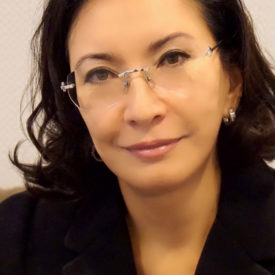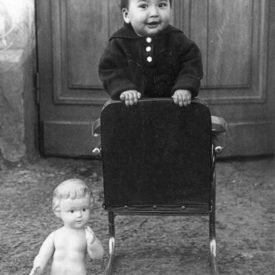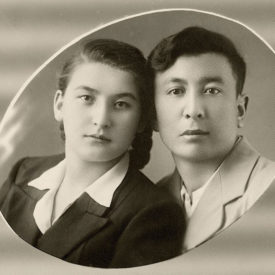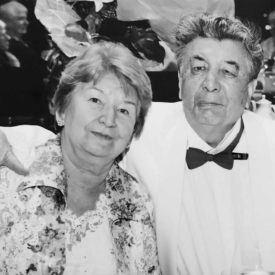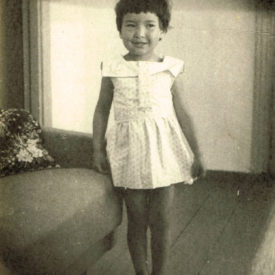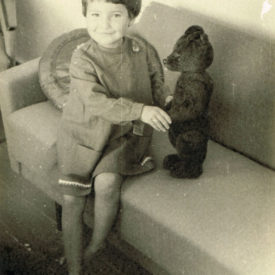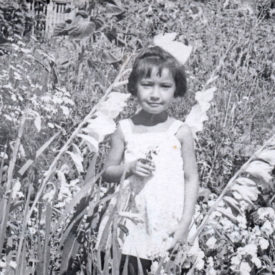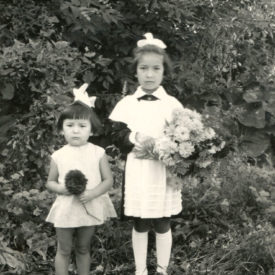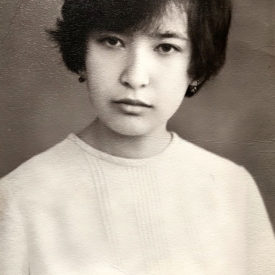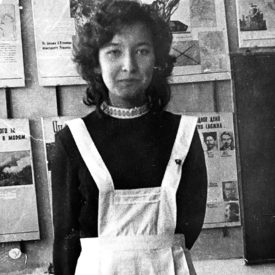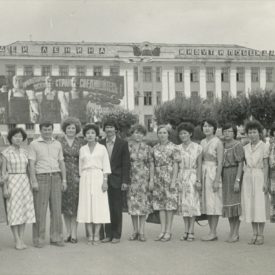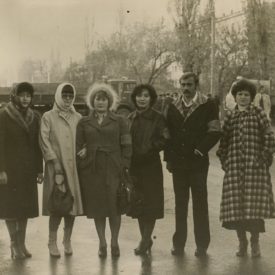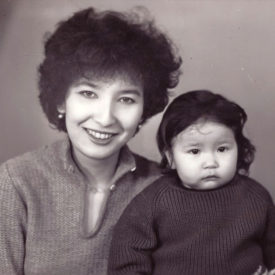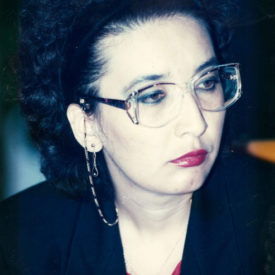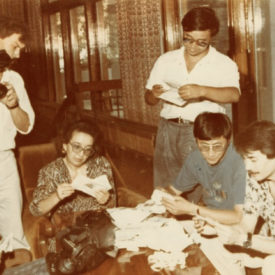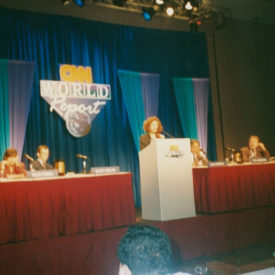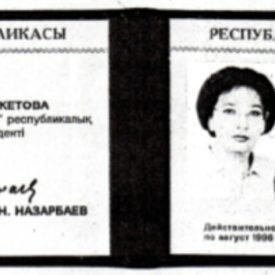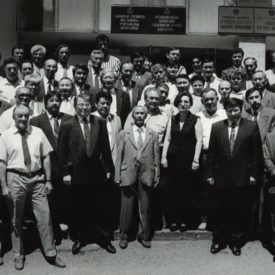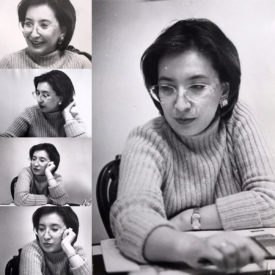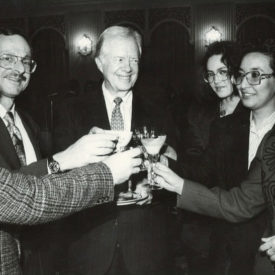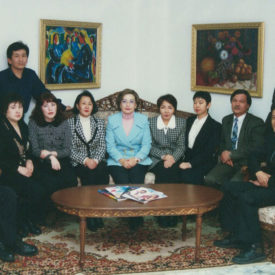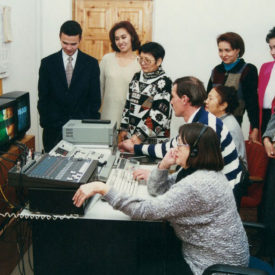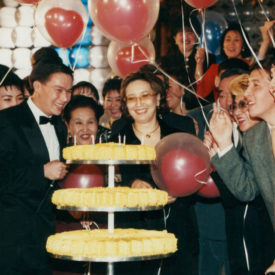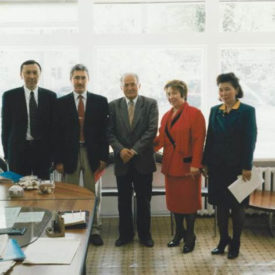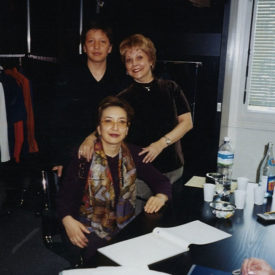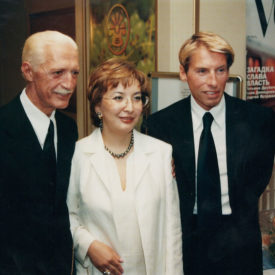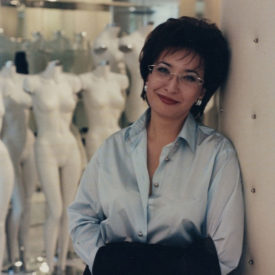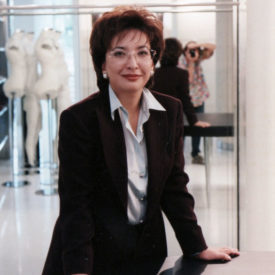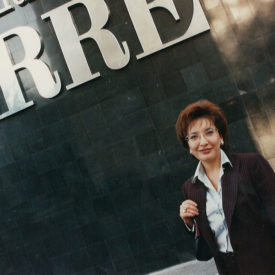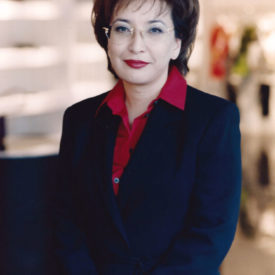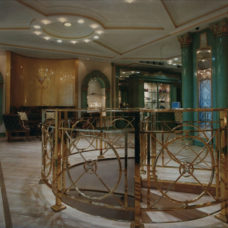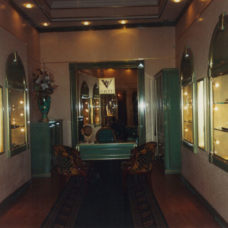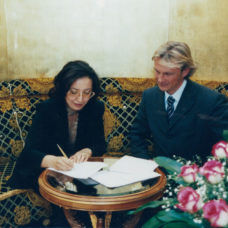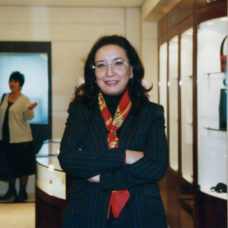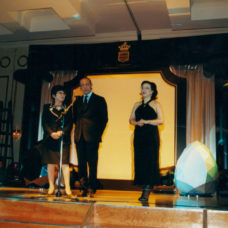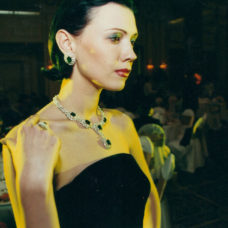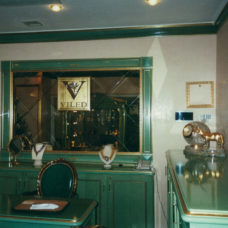Leila Khrapunova
Leila Khrapunova, nee Daniyarova, was born on 19 December 1958 in the village of Irtyshsk, Eastern Kazakhstan.
My father, Kalibek Daniyarov, born in 1931 in the village of Akzhar, eastern Kazakhstan, a scientist, holder of the title Merited Construction Engineer of Kazakhstan, well-known writer, author of many books on Kazakhstan history largely different from its official version accepted in Soviet historiography, received degrees from Leninogorsk Mining Engineering Technical College, and later fromTomsk Polytechnical Institute and Oust-Kamenogorsk Road Construction Institute.
My mother, Rasilya Daniyarova, born in 1940, in the city of Tomsk, Russian Federation, was educated as an engineer.
Leila Kalibekova has two sisters: Galiya, who was born in 1963 and died in 2001; her younger sister Gaukhar was born in 1975.
In 1977, as a second-year student at Irrigation and Civil Engineering Institute, Leila married Asylbai Beketov, a student at the same institute, where he was taking a civil engineering course. They parted in 1993.
In 1998, Leila married Victor Khrapunov, born in 1948, who served as the mayor of Kazakhstan’s historical capital, Almaty, for seven years and also held posts of Kazakhstan’s energy minister, the governor of the Eastern Kazakhstan region and the emergency situations minister.
Leila Khrapunova has three children.
Her daughter Elvira was born in 1979 in the city of Jambul (Taraz), from1994 lived in Switzerland where she finished a boarding school in the city of Lausanne, and then got a B.A. degree in PR & Media Communications from the Geneva International University.
Further on, Elvira received training and served as an intern in the US, where she was certified as Designer of Interior Decor.
Elvira now lives in the USA with her husband and their three children.
My son Iliyas was born in 1984 in the city of Jambul (Taraz) and has since 1998 lived in Switzerland, where he received a bachelor’s degree and a CAS diploma from the Le Rosey Institute. In 2004, he got a master’s degree in MBA from Webster University in Geneva, specializing in Management, International Law and Finance.
Iliyas has two children, is married to the daughter of well-known opposition politician Mukhtar Ablyazov.
My younger son Daniel, born in 1996 in the city of Almaty, has since 2007 lived in Geneva, holds a bachelor’s degree and a CAS diploma from the Le Rosey Institute, studied Business Administration at Whittier College, USA, California. Currently continues his studies at Swiss University.
In 1976, after finishing secondary school in the city of Jambul (Taraz), Leila was enrolled at Jambul Irrigation and Civil Engineering Institute. She graduated from the institute in 1981, receiving an engineering economics degree, with a specialization in Economics and Production Process Organization. She also holds an international degree in Construction Project Management.
From 1988 to 1990 she was taking a course in Organization of Cultural Education at the city of Chimkent (Shymkent) Culture Institute.
Leila Beketova2 began her professional career at the age of 21 as an economist at the city of Jambul’s Regional Planning Commission.
From 1982 to 1986 she held a post of an economist at the Jambul Prefabricated Housing Factory.
Thanks to her managerial and leadership skills, Leila was elected Chairman of the factory’s Young Communist League Committee, gaining experience in managing large professional teams.
In 1986, Leila Beketova2 moved from Jambul (Taraz) to Alma-Ata (renamed as Almaty later) together with her family.
The year 1987 was an important mark in her professional career: she was offered an assistant stage director’s job at the Kazakhstan State Television and Radio Committee. This work opened her yes to the difference between Kazakhstan’s government-controlled television and its international peers.
In 1990, Leila’s own money and a bank loan made up starting capital which helped her establish her first enterprise – TAN Televison Company. Originally established as a television production studio, it soon turned into post-Soviet countries’ first private television company. In In March 1991, TAN Television Company began broadcasting programs in Almaty and the Almaty region with their population of two million, operating as the post-Soviet countries’ first 100%-privately owned TV company. Leila Beketova2 managed to establish from scratch the administrative structure of a private business employing at times up to 150 people. This was a new and very interesting experience to her.
In the same year, Leila Beketova2 becomes a member of the presidium of the Kazakhstan Society for International Friendship and Development of Relations with Foreign Countries. She is extensively involved in cooperation with various international organizations. As part of this cooperation, she in 1993 attended international conference CNN World Report Contributors Conference, presenting report Breaking Stereotypes: How TV news Can Shape, How we view each other in the East and West. Taking and active stance in promoting international relations, Leila was striving to make a contribution to Kazakhstan’s integration into the global television and radio broadcasting network.
In 1993, Leila, 35-year-old then, presented to the Republic of Kazakhstan government her proposals for profoundly reforming the Soviet Socialist Republic of Kazakhstan’s State Television and Radio Committee, an ideological mouthpiece of the Kazakhstan Communist Party, into public service television of public law of the Republic of Kazakhstan, which gained state independence in 1991.
At the same time, this proposal aimed to improve programs’ quality and regulate relations with private TV channels, in particular their artistic, economic and technical aspects.
The project for reforming the Kazakh Soviet Socialist Republic’s government-controlled television and establishing the Republican Television and Radio Corporation was in 1993 highly appreciated by Kazakhstan’s president and government, claiming they were setting course for a democratic system of state power in Kazakhstan.
By decree of the Republic of Kazakhstan president, Leila Beketova2 was, on 4 April 1994, appointed president of the Republic of Kazakhstan Television and Radio Broadasting Corporation enjoying a minister’s status. President Nazarbayev who in the early 1990s presented himself as the country’s democratic leader, decided to appoint Leila to this key post as an innovator and creator of Kazakhstan’s first private democratic television.
In a year’s time, at the start of 1995, president Nazarbayev changed his political views in favor of nepotism in Kazakhstan government, rejected the democratic path of the country’s development, his subsequent line of actions preventing the Republic of Kazakhstan’s public service television from taking shape as a democratic media entity.
In her capacity of a minister, Leila Beketova2 gives her time to building up relations with television and radio companies of developed democratic countries, as she is convinced that the world’s best practices need to be absorbed to build up high-quality, democratic, electronic media in Kazakhstan. With this in view, the Republic of Kazakhstan Television and Radio Corporation signed a best practices sharing agreement with the CNN international news service. A Kazakhstan-French agreement to establish the Star–Terre project became yet another initiative addressing some of Kazakhstan’s ecological problems, in particular salvaging the Aral Sea.
Leila Beketova2, ever open to new information and advanced practices of global leaders, came up in the 1990s with a number of initiatives seeking to establish public service television and radio in Kazakhstan. She led the development of contacts with foreign TV channels, news agencies and international organizations, such as BBC, Inter News and UNESCO, to name just a few.
But the Kazakhstan authorities, as early as the start of 1995 года, became wary of intellectual freedom, free speech and independent democratic media. President Nazarbayev and his government proved to be unprepared and unwilling to follow the path of Kazakhstan’s democratic development. Hence the Republic of Kazakhstan Television and Radio Broadcasting Corporation was, by government decree, made part of the Press Ministry.
Leila Beketova2 was an opponent of the strategy which the State Counsellor, Marat Tazhin, developed for president Nazarbayev to strengthen the executive authority’s control of the national television and radio broadcasting stations. Because of this and as a result of Nursultan Nazarbayev’s pressure, Leila Beketova2 resigned as president of the Kazakhstan Television and Radio Republican Corporation.
In Kazakhstan’s modern history, the year 1995 can be regarded as a year in which the Kazakhstan public lost its right to independent media. Kazakhstan television and radio journalists shed their independent status, losing the chance to follow the International Principles of Professional Ethics in Journalism.
In 1995 Leila Beketova2 resumed her Executive Director’s position at her own TAN Television Company, holding it until1998.
All this time Leila Beketova2 never stopped reflecting on reform that needed to be implemented at Kazakhstan’s radio and television. She devoted a number of publications to this issue and obtained a PhD in 1997 with a thesis on competition in Kazakhstan media. The full title of the thesis reads as The establishment of competition-based market mechanisms in the Republic of Kazakhstan national television.
In 1997, Leila Beketova2 founded a private university with an academic board, Almaty Economic University.
In 1998, on political grounds, Leila had to take a decision to sell TAN Television Company, including its technical infrastructure with its four-storied television complex building.
Given her diverse professional experience acquired through her more than ten years’ work at Kazakhstan Soviet Republic Television and Radio, the president of TAN Television Company, and Kazakhstan Soviet Republic Television and Radio Committee, Leila Beketova2 decides to change her professional career route. In December 1998, she establishes trading company Italian Fashion, opening two premium-class fashion stores: a multibrand boutique Fashion Walk and boutique Gianfranco Ferré.
In 1999, she takes part in the haute couture Fashion Week in the city of Almaty, featuring the European fashion leaders such as Ted Lapidus, Lorenzo Riva, Didier Lecoanet and Hemant Sagar, and Igor Chapurin.
In 1999, Leila Khrapunova1 establishes VILED company – an acronym standing for the names of her family members: Victor, Iliyas, Leila, Elvira, Daniel – specializing in the distribution of luxurious watch, jewelry and accessories brands Cartier, Van Cleef, Damiani, Vacheron Constantin, Harry Winston, Carrera y Carrera, Piaget, Frank Muller, IWC, Wan Der Bawede, Panerai, Baume Mercier, and others.
In Kazakhstan, where entrepreneurship is getting increasingly difficult due to unfair competition and authorities’ corruption, which Leila Khrapunova1 encountered once again, in four years, she had to “sell” her business to competitors affiliated with president Nazarbayev’s family.
Despite the difficulties which Leila Khrapunova1 had faced, she didn’t lose heart and wouldn’t be frightened. She would not succumb to pressure from the members of president Nazarbayev’s clan striving to make her quit business. In 2003, she merged companies which she had established over 13 years in business into the new Phoenix Holding specializing in consulting services and support for small and medium-sized businesses. Leila Khrapunova’s1 idea for its business model was to provide support and guidance to small enterprises as they were established and developed in Kazakhstan, because the country needed small and medium-sized production businesses and creation of new, high-quality jobs.
Leila Khrapunova1 planned to develop an innovative holding as a pioneering real estate development project. To achieve this, she began to build up, as part of the holding, one of Kazakhstan’s first start-up companies providing services to young businessmen who launch their own start-up businesses.
Development of housing, hotel and shopping center construction projects, renovation of commercial real estate, removal of worn-out housing, design and construction of energy-saving housing complexes, construction logistics services, and facility management soon became priority areas of Phoenix Holding’s operations.
In 2005, it became utterly clear to Leila Khrapunova1 that if she meant to continue developing business in Kazakhstan she would have to renounce her principles and swear her allegiance to the Nazarbayev family clan, going along with their totalitarian aspirations.
Unwilling to continue working in the system based on unfair competition and benefitting only those at the helm of power, Leila Khrapunova1 made a hard decision to restructure the holding. In 2005, the holding was fully mobilized and growing steadily, but Leila Khrapunova1 had to wind down the business project because of an all-out pressure on it from the city of Almaty’s authorities, specifically the city mayor I. Tasmagambetov blessed by president Nazarbayev.
Thus lack of fair competition in Kazakhstan, abuse of power by the henchmen of president Nazarbayev, who has perpetuated his rule in Kazakhstan for 27 years, made Leila Khrapunova1 give up her business career in her country.
But she does not give up hope that one day president Nazarbayev’s family clan will have to repay the moral, financial and legal damage inflicted on her family and on a host of Kazakhstani people who have suffered from the Nazarbayev’s rule of corruption.
On 29 October 2007, Victor Khrapunov stepped down as emergency situations minister. Following this development, Leila and Victor Khrapunov together with their younger son Daniel on 9 November 2007 moved permanently to Switzerland where Leila Khrapunova’s1 elder children had lived, studied and worked since 1994.
Notes
1 Leila Khrapunova, nee Daniyarova, Beketova by her first married name
2 Leila Beketova, nee Daniyarova, Khrapunova by her second married name

